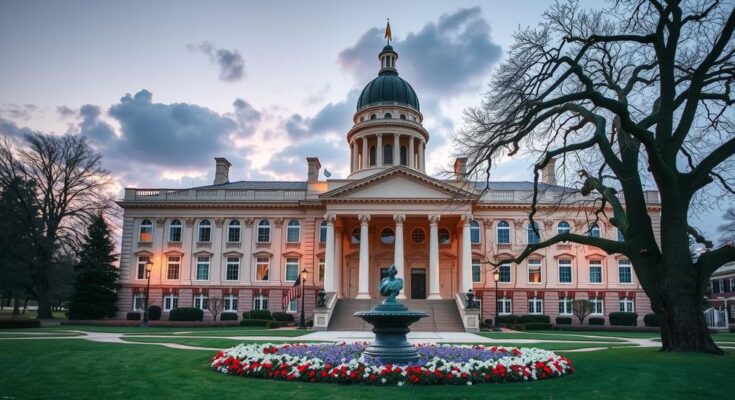Virginia will hold special elections on November 7 to fill vacant Senate and House seats. The results will heavily influence state legislative control between Democrats and Republicans as Glenn Youngkin’s term approaches its conclusion. Candidates focus on key issues such as abortion rights, crime, and the economy to sway voters in a politically transformative landscape.
On November 7, voters in northern and central Virginia will participate in pivotal special elections to fill two vacant state Senate seats and one in the House of Delegates, significantly affecting control of the Virginia Statehouse. These elections occur in the wake of recent Democratic victories and losses, making them more consequential as Republican Glenn Youngkin approaches the end of his governorship.
In northern Loudoun County, Republican Tumay Harding competes against Democrat Delegate Kannan Srinivasan to fill the state Senate seat left vacant by Srinivasan’s elevation to the U.S. House. Concurrently, Democrat JJ Singh and Republican Ram Venkatachalam compete to fill the House seat Srinivasan abandoned. Similarly, Democrat Jack Trammell is challenging Republican Luther Cifers in Goochland County for the Senate position previously held by U.S. Representative John McGuire, who was recently elected.
The outcome of these special elections has broader implications for party control in Virginia, where Senate Democrats hold a 20-18 edge, with Democrats also maintaining a slim 50-49 majority in the House following Srinivasan’s departure. Observers are acutely interested in how these elections reflect voter sentiment following the recent presidential race, particularly after Democratic struggles in previous federal races. \n
Candidates like Singh and Srinivasan emphasize issues surrounding abortion rights in their campaigns, while Harding and Venkatachalam focus their messages on education, crime, and economic concerns. Harding, a daughter of immigrants, articulated, “Our schools are faltering and riddled with politics and division, our neighbors have been made victims of illegal migrant crime…” highlighting her campaign’s focus on securing a Republican majority in the Senate.
The special elections taking place in Virginia are critical in determining the balance of power within the state’s legislative bodies, particularly as the Democratic Party navigates recent electoral setbacks. Historically, Virginia has oscillated between Republican and Democratic control, and these elections represent a vital opportunity for both parties to solidify their influence, especially in an election year where turnout and issue salience are paramount. The implications of the outcomes extend beyond party lines and reflect broader societal themes, including demographic shifts and evolving voter priorities.
The upcoming special elections in Virginia are poised to influence the state’s legislative landscape significantly. With both major parties vying for control, the races spotlight critical issues such as abortion rights, education, and public safety. The results will ultimately shape not only the future of political representation in Virginia but also reflect broader national trends in voter sentiment and party dynamics.
Original Source: abcnews.go.com




